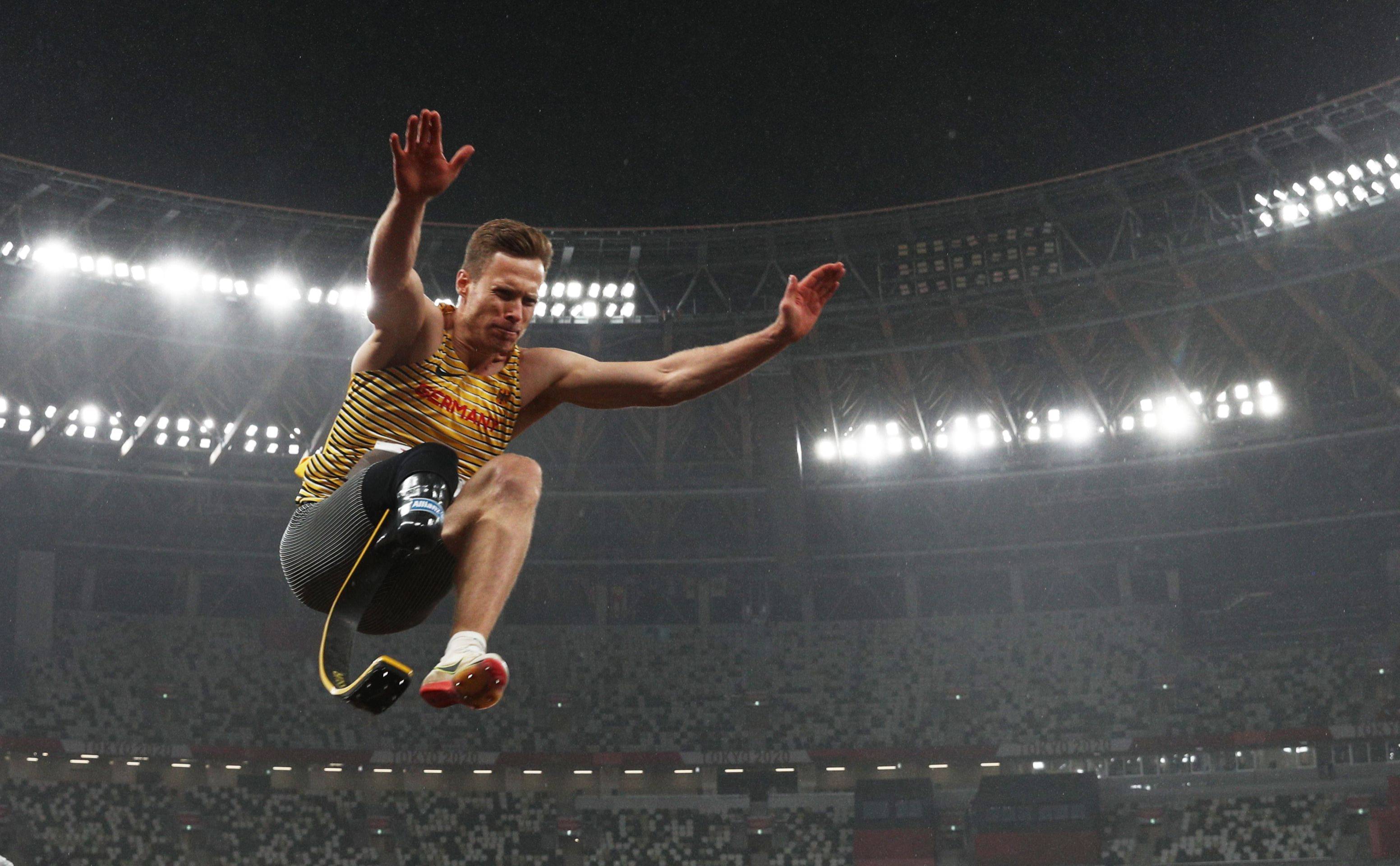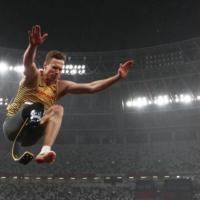Markus Rehm has won three straight Paralympic long jump gold medals and owns a world record that would have given him gold in the last seven Olympic Games.
And he's still trying to find out just how much further he, and the Paralympics, can go.
The German “Blade Jumper” easily won the T64 long jump competition at the Tokyo Games with a jump of 8.18 meters at National Stadium on Wednesday.
Rehm was happy to add another gold to his collection, but admitted he was disappointed to come up short of his world record of 8.62, which he set June 1. He thinks he can do better and is curious about how far he can push the mark.
"It's in my mind," Rehm said. "For me, it's all about fun. It's just fun to jump far and I want to get this feeling more and more often. Because it is like, you get it once and you were actually just flying to the end of the pit. This is my motivation in training.
"I didn't get this feeling today, but I'm sure it will come back."
Rehm lost his right leg below the knee in a wakeboarding accident when he was 14 and jumps with a prosthesis. He's currently so far ahead of other para T64 long jumpers he's essentially competing against his own records.
He was the only athlete to go past eight meters on Wednesday and his worst jump, 7.95, would still have given him gold over silver medalist Dimitri Pavade of France, who jumped 7.39 meters.
The rest of the world is still trying to catch up.
“Markus is my engine for what he does," Pavade said. "Maybe one day I can do it.”
Trenten Merrill, who won bronze with a jump of 7.08, is also chasing the German.
"He's paving the way for everybody, so it's an honor to compete with him," Merrill said. "And I'm going to do my best to get better, so I can give him a run for his money."

There is part of Rehm that would like to see it.
"There's always somebody who has to set the limits higher," Rehm said. "I think this is all about Paralympic sports. The sport is still young, kind of, because compared to (the) Olympics, we are quite young. There have been a couple of world records in different categories and I think we have to have, in each category, somebody who is setting the bar quite high at some point. Then we get the competition that we want. Then we get the competition that we need.
"When I started long jumping, the world record in my category was below seven meters and look where we are today."
Four out of six jumpers surpassed seven meters on Wednesday.
"I think we want to keep going and set it even higher," Rehm said. "To prove what is possible. When I was young, so many people told me what I can and what I can't do. People ask me if I can swim, well, yeah, of course I can swim. Or can I do wakeboarding? Well yeah, that's why I have a prosthetic leg. So I can wakeboard, and if it breaks, I get a new one. But I can do it, just maybe in a different way.
"I think it's something cool about the Paralympic Games. We just prove that we can still do everything."
The German wants to prove that at the Olympics.
"For me, it's fun to jump far, but I actually wanted to prove also that we can jump as far as Olympic athletes," he said. "I think we did this year already."
Rehm wanted to compete at the Rio Olympics in 2016, but Germany was not able to prove his prosthesis, a carbon-fiber blade, did not give him an advantage. The Court of Arbitration for Sport rejected his bid to compete at the Tokyo Olympics.
"I was always transparent," Rehm said. "I also invited, at that time the IAAF (the world governing body now known as World Athletics), to take part in the study we did together with NHK. They weren't interested.”
Rehm was part of a 2016 study conducted jointly by the German Sport University in Cologne, Tokyo’s National Institute of Advanced Industrial Science and Technology, the University of Colorado and the Japanese broadcaster. Rehm said on May 30 of that year the study showed there was no clear advantage for athletes who use prosthesis. According to a Reuters report released the same day, scientists involved said the study revealed athletes like Rehm “had a less efficient start but a more efficient jump.”
“I think today, we've seen that other athletes have exactly the same blade as I use, but I'm still jumping quite a bit further,” he said.
"I think that's the main argument, if it comes to the blade, that everything is just about the blade, OK, look at all these guys, they have the same blade, but why is there such a gap? There's an athlete behind the blade."

Rehm says he's not trying to gain an edge on athletes without disabilities.
"This I also hear sometimes, 'You have an unfair advantage.' I mean, what should I do? I don't wanna have one, but what to do? I can't jump on one leg."
The German’s ultimate goal, he says, is to help the evolution of the Paralympics.
"My biggest dream is to bring Olympic and Paralympic athletes closer together," Rehm said. "That's my biggest dream, to make the Paralympic Games even bigger than they are now.
"Competing at the Olympics, this would be one step closer to that dream, because all the people knowing about the Paralympic Games, they watch us already.
"But I think there are so many more people out there who would love to watch it. But they still don't know about us much. So I would like to show it to all of them, because I think we have great and inspiring athletes among us, not only in athletics."
Rehm said he wasn't given a clear reason about why he was denied the chance to compete at the Tokyo Olympics and struggled with that for a few days.
"There's no explanation why I could not compete," he said. "And this is just a shame. The week after was pretty tough, but then I started to focus on the Paralympic Games."
The German wonders if the challenge of competing in the Olympics may have helped push him past his current record.
"And it is not an excuse (to) why it didn't work that well today," he said. "I mean, it worked out really well. I get the gold medal, but the distance, maybe it would have worked out if there is a different competition. You know, if you have to jump far, it is also different."
The German will be back in Japan for the world championships in Kobe in 2022, by which time he hopes fans will be allowed in venues. The next Paralympics will take place two years after that, in Paris.
"We just have to keep going," he said. "You know, this year we couldn't show everything to all the people right here in the stadium, but I hope that many people watched it back home in front of their TVs. I think that we have a big chance the next three years to work together and we have to prepare people for Paris."





















With your current subscription plan you can comment on stories. However, before writing your first comment, please create a display name in the Profile section of your subscriber account page.